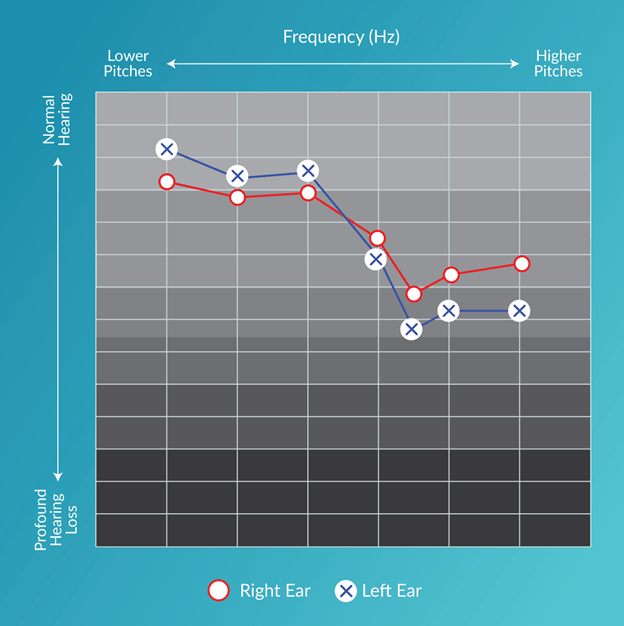How Hearing is Measured
Measuring hearing is not as straightforward as determining a percentage of hearing loss.
When we are asked to explain the state of someone’s hearing, it is inaccurate to provide a simple answer.
Describing hearing simply as “good” or “poor” doesn’t capture the complexities of hearing loss. The volume or intensity of sounds tends to vary at different pitches, and your individual hearing profile – how well you can hear certain sounds – results in an entirely unique experience.
When we measure hearing loss, our goal is to map out the profile of your hearing. No matter the hearing challenges you face, this information will help us recommend options that have the best potential for your hearing.
At Audiology First, we go beyond describing hearing as good or poor. Using more measurements and information, we can customize any treatment and technology according to the ways that you experience hearing.
Challenges with measuring hearing
Hearing loss tends to vary at different pitches. For example, some people may have trouble with high pitches while others struggle to hear low frequencies. There are patterns depending on the type or causes of hearing loss, but these trends are far from uniform.
This means that people experience the effects of hearing loss in different ways. Certain situations or environments that are more difficult for you may not be as challenging for someone else with the same extent of hearing loss.
It is essential to understand the specific pitches that are impacted. There is a range of pitches that contribute to hearing sounds related to speech, so a hearing loss in this range can make it difficult to comprehend others. Even a mild loss in this range can have notable effects on understanding speech.
It is more accurate to quantify hearing loss in terms of a “degree of loss.” These degrees range from normal hearing to mild, moderate, severe or profound, and an individual’s degree of hearing loss will often vary across different pitches and types of sounds.
Better ways to measure hearing loss
Always start with a hearing test
A comprehensive hearing test is vital to both a diagnosis of your hearing loss and a treatment plan.
During your hearing test, your audiologist will discuss your medical history and lifestyle, which helps us understand how you hear sounds in different situations.
We will then conduct a range of non-invasive hearing tests. This can include a physical examination of your ears, a review of your neurological functioning and measurement of your ability to understand speech.
Hearing loss can be challenging to understand, but a hearing test is a primary tool used to obtain data and gain insight into how you experience sounds and what is happening in your ears and brain.
Visualize your hearing in an audiogram
Using the information from a hearing evaluation, your audiologist will summarize the results in the form of an audiogram.
An audiogram is a graph that shows the quietest sounds you are able to hear at different frequencies, and it indicates the degree of loss across different types of sounds. The nearer the marks on your audiogram are to the top of the graph, the softer the sounds are that you can hear at that frequency.
Everyone’s audiogram is unique, and your individual graph can help you to understand the impacts of your hearing loss on your daily life. It will show which pitches are more difficult to hear and how each ear performs.
Speech intelligibility index
The speech intelligibility index is a measure ranging from 0 and 1 that represents the amount of speech that is both audible and comprehensible in a variety of listening conditions.
It can be generated from the data depicted on your audiogram, and it is highly correlated with speech understanding. As the speech intelligibility index increases, speech understanding generally increases.
Individuals experiencing hearing loss will often find it difficult to understand speech – particularly in noisy settings.
The speech intelligibility index enables audiologists to quantify the impact of hearing loss on the audibility of speech in both quiet and noisy environments. Noise masking, filtering and reverberation conditions can be simulated to predict your speech intelligibility in difficult hearing environments based on the proportion of speech cues that are audible to you.
A speech intelligibility index of 0 would mean that none of the speech in a given setting is audible or comprehensible, and an index of 1 would mean all of the speech was available to the listener.
The speech intelligibility index is a useful tool to understand and describe how your hearing loss impacts the way you comprehend speech. It is relatively easy to interpret and can help explain to your family and friends why your hearing loss not only impacts how well you hear sounds but also how well you understand speech.
Go beyond measuring your hearing
At Audiology First, we go beyond measuring hearing. Our evaluations seek to understand the reasons for your hearing loss, and we will examine where within the ear system there might be a problem.
We will visualize your hearing in an audiogram and determine the speech intelligibility index. Most importantly, we will connect the type and degree of loss you experience with the hearing challenges you face in your daily life. And then use this information to recommend the best next steps in your hearing care.










